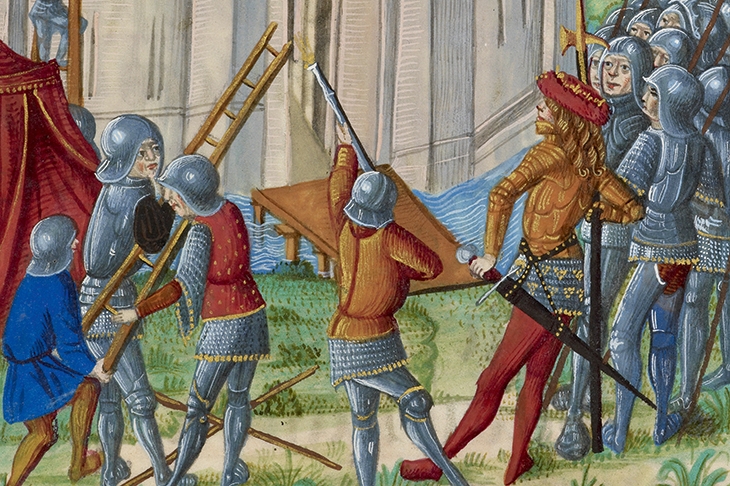Lionheart! Saladin! Massacre! There is no shortage of larger-than-life characters and drama in the epic, two-year siege of Acre, the great set-piece of the Third Crusade. But, as John Hosler relates in this accomplished study, there was so much more besides. Acre proved the strategic point for armies from across Europe, Syria, Egypt, Mesopotamia and the Maghreb; and the siege provided a kaleidoscope of competing ambitions, objectives and self-serving manoeuvrings amid the most arduous conditions, in which Bedouins ‘exchanged the severed heads of their victims with Saladin in return for robes and gifts’.
The coastal city of Acre, in present-day Israel, was the first objective of the crusaders, as it would be their primary port for supplying the army. If their ultimate goal of Jerusalem were to be won again — it had fallen to Saladin in 1187 — Acre had to be taken.
The siege began in late August 1189, before the arrival of the crusade’s pre-eminent leaders: King Richard I of England, King Philip II of France and Emperor Frederick Barbarossa. Barbarossa never made it: preoccupied with a fear of drowning, he took the long land route to the Holy Land instead — and died in a river in Turkey. The crusaders were, at this stage, led by Guy de Lusignan, the King of Jerusalem, who had been lucky to escape execution when captured by Saladin at the battle of Hattin two years earlier.
Hosler, who shows a keen understanding of medieval warfare, relates the chaos of combat in gripping detail — the battles, artillery barrages, mining, ramming, attempts at escalade and numerous naval encounters. An attack on Saladin’s relief army was beaten off, and Saladin continued to harass the crusaders as they tried to press home the assault on the city. Three vast siege engines, protected by hides soaked in vinegar, were brought up to the walls, only to go up in flames after the garrison used naphtha against them. The unfortunate Emir Husam was also a victim of great balls of fire: he was ‘knocked off his horse by a knight and, in the process, immolated his testicles with his own Greek Fire’.
The casualty rate intensified, claiming many high-profile deaths among the nobility serving there. Hosler estimates that a third of the 30,000 crusaders died in the first year alone. The Christians made only marginal progress until Richard and Philip arrived in 1191 with an extra 10,000 men. Philip, whose role in the crusade is often underestimated and even much maligned (though not by Hosler), arrived first, in April. An uninspiring commander who lacked charisma and chivalric style (which the optimistic efforts of his court biographers could do nothing to rectify), he and his six ships were met with polite gratitude but little excitement.
The flamboyant Richard appeared dramatically, with 25 ships, two months later, to a rapturous welcome and all-night party. This was not surprising given that, en route, he had sunk a Muslim ship full of men and supplies heading for Acre; had got married; and had even conquered Cyprus. The Lionheart was an immodest man, with much to boast about.
Although the chronicler Richard of Devizes disparages Philip’s contribution — describing the French king holding Richard back ‘like a cat with a hammer nailed to its tail’ — both leaders worked effectively together, despite their arch rivalry. Their presence enabled the siege to be intensified. Artillery and mining brought down sections of the walls as well as the Cursed Tower, an integral part of the city’s defences. On 11 July, an assault led by Richard and the Pisans finally broke the resistance of the exhausted, starving garrison; fearing, as one Arab chronicler writes, that they ‘would all be put to the sword if the city were carried by storm’, the garrison surrendered the following day.
But put to the sword they were. In an act that embodies the savagery of the crusades, at least 2,700 of them were marched out of the city and beheaded in front of Saladin’s vantage point some distance off. Richard has earned the opprobrium of historians for this ruthless act, but Saladin must take his share of the blame. The garrison was to be exchanged for Christian prisoners and ransom, but Saladin deliberately procrastinated. Richard, with thousands of prisoners to guard and feed, was losing both momentum and face. He ordered the massacre and set out for Jerusalem.
Despite winning more spectacular victories along the way, Richard realised that recapturing the Holy City was logistically unfeasible. But the bloody, costly and ‘improbable’ victory at Acre secured the existence of the Kingdom of Jerusalem for the next century. In 1291 Muslim forces stormed the city and, in a deliberate nod to the past, performed their own reciprocal massacre.





Comments